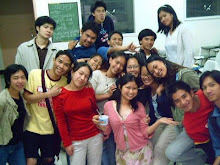THE dispute over the tree began after the last typhoon of October when the new neighbor got to thinking that the tree might get uprooted by one more storm and fall on his newly-built house, such as what recent incidents have shown.
Content with the belief that the old man from whom he bought his land had also included the tree, he immediately filed for a permit to cut it down. It was around that moment that my cousin heard about the neighbor's intentions, reporting it to the immediate heads of our family who immediately contested any possible outcomes that would result to a tree cutting.
The dispute took itself legally and went to the barangay officials where it was summarily agreed that the tree would be cut down to avoid the real possibility of it falling upon the neighbor's head.
My mother was greatly saddened by the outcome, and a little angered by it too, because for her, the tree was a legacy from their late father who planted it to mark the division between his land and the old man's. The memory of her father reminding them to take care of that tree still echoes in my mother's mind, and perhaps this was the reason for her anger, for she feels that somehow, they are betraying their father's memory, which had already begun when her siblings sold part of his land.
I never knew him, this man who planted that tree, but I knew from stories that he was poor; living in a time where having land does not entail wealth, unless it also includes a herd of cows or seeds to plant. He claimed a whole mountain side though, and took care of it, perhaps anticipating the future where his children have prospered by themselves and will need land to build their own homes and to give to their own children.
Such foresight, if indeed it was, proved beneficial as my mother and aunts and uncles built their homes and had their own families. In family occasions of old, these siblings would get together along with their spouses and children, coming up to 50 people at the most, excluding the littlest of cousins or nephews and nieces.
My grandfather's land had diminished as the years passed. Typhoons stripped a little soil and caused bigger landslides. Some neighbors encroached and went beyond the agreed boundaries.
Mostly however, some of my aunts and uncles sold a few square meters, mainly on the sly or perhaps because they believe that it is their right and their other siblings do not deserve to know; causing a great deal of heart ache that was discussed only in whispers.
Like the tree, the land had been the subject of disputes, internally and externally. Unlike the tree however, the land had been saved somehow, and my generation will get its own piece of legacy.
Hopefully, we will keep it better than our elders, even if most of us haven't set foot on that land for years as we scattered around the world. It is yet home. I hope that it will still be there though when everyone comes home, unlike the tree, which would be cut down before this year ends, unremarkable to us grandchildren, and secretly mourned only by my mother, and her siblings as one more thing lost to memories.
To join Ubbog, writers in Ibaloi, Kankanaey, Iluko, Ifugao, Bontoc, Kalinga, Kalanguya as well as in English and Filipino below 30 years old may send manuscripts composed of any of the following: 5 poems or essays or 3 short stories or one-act plays to ubbogcordillera@gmail.com.








No comments:
Post a Comment